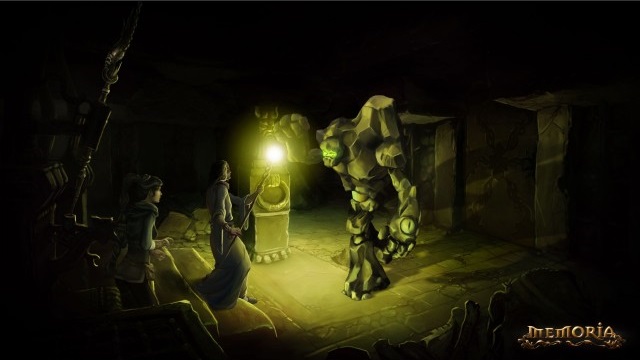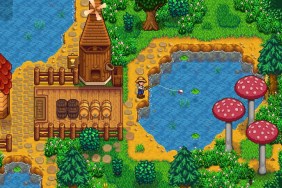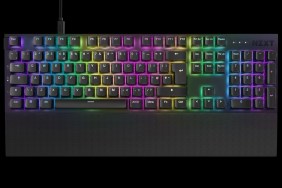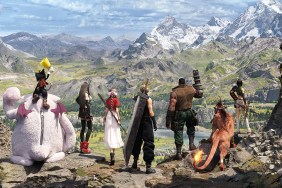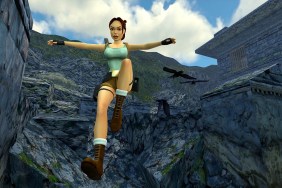A point-and-click (and click and click and click) adventure.
I have fond memories of point-and-click adventures. Back in the day, games like Maniac Mansion and Zak McKracken and the Alien Mindbenders were not only fun but innovative in both gameplay and humor. The MacVenture series, Sierra Games, and LucasArts (formerly LucasFilm Games, currently another victim at the hands of Disney) thrived on the point-and-click, and even as console gaming climbed up into the mainstream, the graphical adventure genre maintained a stronghold on the PC gaming community.
Of course, gaming has advanced monumentally since those days, but the point-and-click adventure is still alive and well, primarily on PC. The SCUMM engine and text-based gameplay has been substituted for graphical interaction, but the idea is still the same: click things, click other things, solve problems and converse, and generally save the world from doom and destruction or otherwise nasty problems.
The Dark Eye: Memoria is the latest in the point-and-click adventure category of games, and it evokes fond memories of the pillars of the genre. Namely, it made me wish that I was playing Maniac Mansion instead.
Memoria is based off the lore of The Dark Eye, a German pen-and-paper roleplaying game originally introduced to the English-speaking world as Realms of Arkania. While the game is a direct sequel to The Dark Eye: Chains of Satinav, it’s not necessary to play the first to understand the second;
“necessary” being the keyword. Knowledge of the first game will definitely help the cause in Memoria, as key elements of the game carry over into the plot of the sequel. Taking the role of Geron the bird-catcher, players set off to break a curse on his girlfriend, Nuri, a Faerie who is trapped in the body of a raven. Geron is told of the traveling merchant, Fahi, who claims to have what it takes to reverse Nuri’s curse in exchange for information on Satja, an ancient princess and demon huntress involved in a pivotal historic battle 500 years in the past.
The game flips between controlling Geron in the present day and Satja in the past, which is unfortunate considering Satja is a far more interesting character than somewhat-whiny Geron. While one complains of his bad luck and how horrible his city is, the other is a princess who doesn’t take crap from the men she’s traveling with, finds a magic staff possessed by a demon, and uses it to control the minds of giant beings made of rock known as Guardians. By the time you’re captivated by Satja’s storyline, Memoria decides this would be a good time to flip back to Geron. Killjoys.
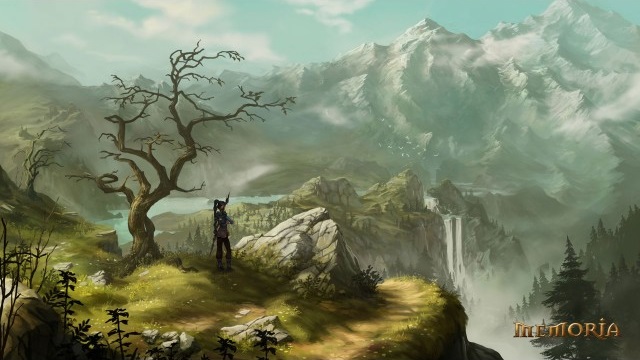
The graphics in Memoria are beautiful, with a distinctly European flair. Favoring stylization over realism, the characters are highly detailed both in action and in cutscenes, from the etchings in Satja’s staff to the disturbingly creepy monkey on Fahi’s shoulder. And, as might be expected from a point-and-click adventure, gameplay and control are fairly intuitive, and there’s a quick tutorial phase at the beginning of the game.
It’s a good thing the controls are intuitive, because this point-and-click has a lot of pointing and a lot of clicking. A lot of clicking. Because while the controls are intuitive, the puzzles are not, and Memoria gives you very little to go off of.
For example, one of the earliest situations featuring Geron requires him to make a salve. First, grind up an herb. But you have to find somewhere to put that herb. Then you have to find some way to grind it up. There are items in the room which you might figure would do the trick. In the real world, it would make sense. But attempting these action gets you only an excuse, a “No” or “I’d rather not,” or worse, the smarmiest reaction Geron has, “Why would I do that?” Fine, Geron, you figure it out.
h wait, you can’t. I’m doing it for you. After trying everything in the room that would make sense, my mouse wafted down to the bottom randomly, where my inventory popped up. The inventory menu is not readily visible nor does it have an icon. What it did have, however, is a knife. Well, that would have been something nice to know fifteen minutes earlier. But after you grind up the herb, then it’s too fine to be moved to the pot that it needs to go in. It’s one frustrating minor issue after another that loses its fun factor really quick.
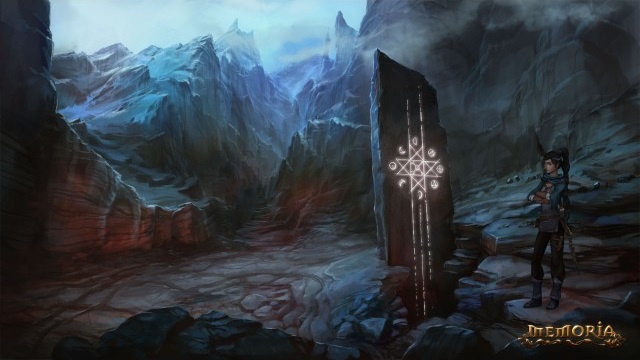
There are even some puzzles that you’re in before you even realize it. Later in the game, Geron must distract some people to sneak into an encampment; in order to do this, Nuri stands behind a stone statue that the people are investigating. You select what Nuri is to say, and it seems like it works, but unless you get the exact correct combination of words, it doesn’t distract the people long enough. I had no indication about how to do this, until I noticed that occasionally Nuri’s response to your prompts was different on different combinations. It’s like setting up a game of Mastermind and expecting someone to figure out the combination without telling them how to play the game.
It seems odd to say about games featuring haunted castles and disembodied tentacles, but with games like Shadowgate and Maniac Mansion, while the problems may have been difficult or required many steps, there was usually a modicum of sense to the solution. Want to mail something off? Find an envelope, acquire some stamps, put the thing in that envelope, write the address, stamp it, send it off. The puzzles don’t always make sense in Memoria to the point that it repeatedly made me quit in frustration. Had it not been for this review, I probably would have uninstalled it within a week. Fans of high fantasy might enjoy The Dark Eye: Memoria more than others; the average gamer will most likely give The Dark Eye the stank eye.
-
Rich graphics with a European feel
-
Intuitive controls
-
Interesting storyline when controlling Satja
-
Not so much with Geron
-
Puzzles are frustratingly hard
-
Game offers very little in the way of leads at times
-
Often hard to tell if progress is being made
